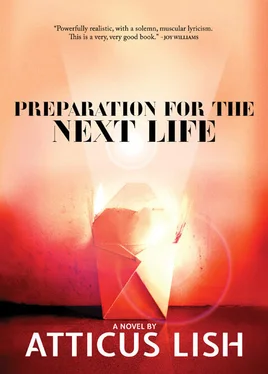She moved closer.
While you go to party, I do some exercise you will like.
She picked up his thick heavy hand and set it on her thigh and flexed her leg.
You feel it?
He took his hand away and rolled over to face the wall. He pulled his Goarmydotcom t-shirt over his face to block the light.
She looked at him more closely and said now she could see how he truly might be sick.
To be near him, she stayed and read his magazines instead of leaving. There was perfect silence except for her flipping the pages until late into the night.
Have I done something to bother you? she asked.
No, he said.
Okay, she said. But I warn you, I’m very tough. Even you aren’t nice to me, I don’t go away.
Where she was from, a man and woman might live apart for many years, due to economic reasons, only seeing each other once or twice a year when they were given permission by the authorities.
HE WENT TO SEE her at her job at eleven in the morning on a week-day. He went inside, but it was the middle of the rush and he couldn’t see her, so he left and smoked a cigarette on Main Street in front of Modell’s and Burger King.
A cast of characters stood around under the awnings waiting for the bus, smoking, watching the street, going nowhere, not functioning, some of them with canes — the people they called Jerry’s kids in the army and razzed each other about being, because so much of the military, including its most outstanding soldiers, came from the lower end of civilian society. A female in pink terry cloth sweatpants was screaming on her phone.
I’ll go to jail! she insisted. Yes, I will! I got a baby inside me. At least I’ll get fed… Stop talking! Stop talking! What happened to the twenty dollars I gave you?
He finished his cigarette and went back to the mall. The mall was an office building that had been taken over by the Chinese. In its present state, everything had the half-finished, jerry-built appearance of transition from one thing to something else. There were cardboard shipping containers littered around the floor. Some units had bare concrete floors and raw cinder block walls, others had carpets and wall coverings and fluorescent lights. One room was being used to warehouse thousands of dried medicinal herbs, which were stored in a chaos of buckets, tubs, bins, bowls, cups, wooden drawers — containers of every description — anything that could be used to hold something else, even paper envelopes — none of it organized, all of it just lying there, while a twenty-year-old guy with a gold chain chewed wontons with his mouth open and watched a DVD. The sign over his head said Cohen’s Fashion Optical. You couldn’t tell what was old and what was new. You couldn’t tell whether something was coming or going. Things were in the middle of being built and destroyed at the same time. It was an environment he might have recognized.
Senior citizens wearing Red Army hats, people who had lived through thirty years of war and revolution, paced around as if they were on inspection and approved of everything they saw.
He put his shades up on his head and looked for her beyond the customers but could not see her: her counter was still busy in the food court. So he turned around and went back outside again.
This time, he crossed Roosevelt Avenue and went under the train tracks, where two tall Africans were standing, the sun shining on their dull black faces and dusty looking clothes. Ahead was the building where she had first worked, where he had met her, and he saw a knot of men inspecting something, their hands clasped behind their backs. Between their legs he caught a glimpse of flesh. He thought they were staring at someone injured on the street, and he looked around automatically to see if there was more to it: anything burning, relatives crying, calling out for vengeance. But the traffic was flowing normally past the restaurants. He went over and looked over their shoulders and saw that they were looking at a series of blown-up photographs propped up on the sidewalk.
The first one was of an Asian woman in her forties, face in profile, holding up her dress to reveal a blackened buttock, in the center of which was a deep abscess. There was another photo of a woman’s torso. Her breasts had been removed. Her chest looked like lasagna. In another image, you saw the white sheet she was lying on. From the attitude of her face, it was clear that she was dead. People had Chinese toe tags. Someone’s legs had been photographed to show bruises. In the shot, there was a hand holding a ruler indicating the dimensions. There was a photograph of wadded blood-soaked clothing on a cement floor near a drain.
A woman came towards Skinner as if a magnetic force were pushing her towards him and asked him to sign her clipboard. Her eyes were luminous and although she did not have a forceful voice, she gazed blankly and steadily at him with her eyes and kept talking like a computer that could not be turned off.
The human rights criminal, she said.
I’m not signing anything.
When she persisted, he said:
I don’t know you. You can fake those. He shrugged from behind his shades. You’ve got, what, four bodies? I’ve got two hundred pictures like that on my camera at home.
A man who was working with her told her in Chinese not to talk to Skinner, and she broke off talking to him immediately.
Skinner looked at the pictures again before he moved on.
No friends of mine, he thought.
At a stand where you could see the models on the magazine covers, Skinner said, Now, that’s what I’m talkin about, and a Pakistani turned to watch him.
He smoked a cigarette halfway and snuffed it on his boot sole.
He went across Kissena to a takeout joint and ordered pork fried rice. There was a communication problem with the people who ran the place, but nothing that couldn’t be overcome by pointing, or so he thought. A man took the meat off the hook in the window and chopped it with a cleaver right in front of him. They charged him more than he expected. Roast pork. I thought I was getting that one there. See where I’m pointing?
They brought someone else out to explain. You get roast pork. Look, there are two, you get expensive one.
No shit, Skinner said. I bet that was an accident.
He went and sat.
The rice was cold and the grease was larded all throughout the rice and turning thick and white. When corpses burn, he remembered, the fat cooks out and you get wax congealed on everything. His fork was rancid. The smell triggered something inside him and he left his plate and went outside and thought he was going to be okay in the cold, but then two seconds later he bent and gagged and vomited a mouthful of orange stuff in the center of the sidewalk. People went around him and, from a safe distance, looked at him. He went back inside and started pulling napkins out of the dispenser, wiping up his face.
When he was clean, he wiped his eyes and bought a soda somewhere else. He smoked another cigarette. His hands stopped shaking, he wiped his eyes, and he was fine again.
At a newsstand, he made his way to the back and started looking at the magazines, not seeing them, picking them up and dropping them back in the metal slot, one after the other.
The Pakistani’s dark face followed him like a radio dish as he was leaving.
You need help?
Not from you.
He went back to her job again and sat at a table in the food court, his face impassive, his body slouched and motionless as if he were stoned — except for his foot jiggling up and down like a motor beneath the table.
When she came out to collect trays, she saw him at once in the teeming crowd.
Hey! I do not see it’s you! I’m surprising!
Читать дальше












